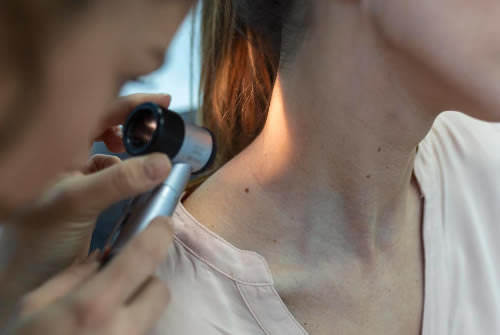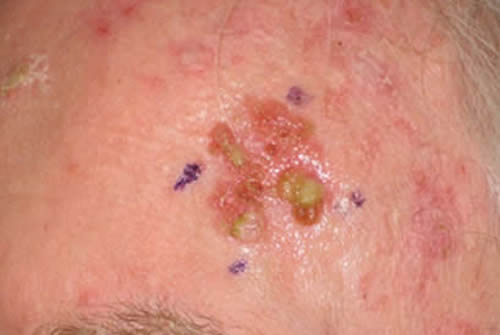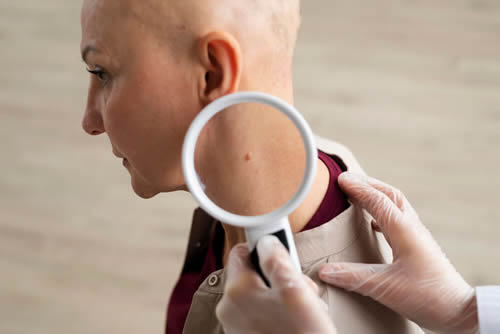
Eczema is an itchy rash that can be one of the most annoying and uncomfortable skin conditions there is. It can occur anywhere on the body and may start as a simple rash but can worsen into a very red and extremely irritated area when scratched.
There are several different types of eczema that an experienced physician like Dr. Raskin in Bakersfield can diagnose. Some common types are:
- Atopic dermatitis: occurs in infants and children but can linger through adulthood. The signs are severely itchy, scaly areas on the insides of the elbow, behind the knees, on the face, or anywhere else on the body.
- Contact dermatitis: occurs when the skin is exposed to an allergen, which may be simply something you are allergic to or something like poison ivy.
- Seborrheic dermatitis: chronic eczema affecting body parts with numerous oil glands, such as the scalp, eyebrows, nose and chest. The affected areas have a flaky white appearance.
- Hand eczema: red, itchy, dry, flaky, cracking, blistering hands or feet are all signs of hand eczema.
There are some general tips that can help eczema patients manage their symptoms. Avoid long hot showers that can remove moisture from the skin and apply lotion while the skin is still damp after bathing to seal in moisture. Choose breathable soft clothing and avoid itchy fabrics. Select creams or lotions specifically formulated for eczema symptoms that are gentle and fragrance-free. Popular products for relieving itching and skin irritation contain ingredients such as shea butter, colloidal oatmeal, and hyaluronic acid. Experts also recommend avoiding alcohol-based products and fragrances that may trigger eczema flareups.
Eczema treatments include corticosteroid ointments, antibiotics, oral corticosteroids, or injectable biologics. Therapies like wet dressings or light therapy may also be successful in treating eczema patients. Seeking professional help with Dr. Raskin is a great step in reaching your goal of controlling or even eliminating the irritating symptoms of eczema. Schedule an appointment today.

Skin cancer is the most common form of cancer in the United States, with more than 3.5 million cases diagnosed each year. While it is highly treatable if caught early, it can be deadly if left unchecked. That’s why it’s so important to see a dermatologist for regular skin cancer screenings.
During a skin cancer screening, a our dermatologist will examine your skin from head to toe to look for any suspicious moles, growths, or other abnormalities. They will also check for any changes in the size, shape, or color of existing moles, as well as for any new growths that may have appeared.
If the dermatologist finds anything unusual during the screening, they may recommend a biopsy to confirm the diagnosis. A biopsy is a simple procedure in which a small sample of the suspicious tissue is removed and examined under a microscope to determine if it is cancerous.
If the biopsy reveals that you have skin cancer, the dermatologist will work with you to develop a treatment plan. This may include surgery to remove the cancerous tissue, as well as other treatments such as radiation or chemotherapy.
The earlier skin cancer is detected, the easier it is to treat. That’s why it’s so important to see a dermatologist like Dr. Raskin for regular skin cancer screenings. Even if you don’t have any obvious signs of skin cancer, it’s still a good idea to get checked out by a dermatologist on a regular basis, as they are trained to spot even the smallest and most subtle changes in your skin.
The DO’s and DONT’s about skin cancer
DO:
- Wear protective clothing and accessories, such as a wide-brimmed hat, sunglasses, and long-sleeved shirts and pants, when you’re outside, especially between 10 a.m. and 4 p.m. when the sun’s rays are the strongest.
- Use a broad-spectrum sunscreen with an SPF of at least 30 on all exposed skin every day, even on cloudy days. Be sure to apply enough sunscreen and reapply every two hours or immediately after swimming or sweating.
- Seek shade when the sun’s rays are the strongest, especially between 10 a.m. and 4 p.m.
- Get vitamin D safely through a healthy diet that includes foods naturally rich in vitamin D, such as fatty fish and egg yolks, and/or by taking a daily supplement.
- Examine your skin regularly and check with a dermatologist if you notice any changes in the size, shape, or color of your moles or any other unusual growths on your skin.
DON’T:
- Don’t skip wearing sunscreen because you’re using insect repellent or wearing protective clothing. Both are important for protecting your skin.
- Don’t use tanning beds or sunlamps. The UV radiation from these sources can increase your risk of skin cancer.
- Don’t rely on the SPF in your makeup or moisturizer. These products are not meant to replace sunscreen and typically do not provide enough protection on their own.
- Don’t let yourself burn. Even one severe sunburn can increase your risk of skin cancer.
Schedule your skin cancer screening at our Bakersfield location.

Taking proper care of your skin achieves more than simply looking good. Not only will you help avoid wrinkles and blemishes, you can also reduce your chances for problems like skin cancer. Experienced dermatologists like Dr. Bernard Raskin in Bakersfield can provide tips such as these for maintaining healthy skin.
Wear sunscreen
Choose a broad spectrum sunscreen that you like well enough to consistently wear. Look for an SPF factor of 30 or higher and use it on all body parts exposed to the sun. Wearing sunscreen will help avoid sunburns and lower your risk of skin cancers like melanoma.
Wear protective clothing
Look for clothing that is rated for sun use. Some clothes have a UPF rating, or ultraviolet protection factor, to indicate how much the type of fabric may offer sun protection. To block out damaging sun rays, choose clothing with rated UPF 50 or more.
Limit sun exposure
Prolonged sun exposure contributes to issues like wrinkles, skin discoloration, and fine lines. Follow recommended precautions like sunscreen and protective clothing and seek shade whenever possible.
Wash your face
At least once or twice daily, wash your face with a gentle facial cleanser and warm water. Avoid harsh products that may harm your skin. The goal is to eliminate dirt, chemicals, oil and other impurities from the surface of your skin.
Moisturize your skin
Select a moisturizer, cream or lotion recommended to gently protect your skin from dryness. If your skin is oily, find products that are labeled oil-free that will safely hydrate skin without making it even oilier.
Exfoliate your skin
Remove dead skin cells once a week by using an exfoliating scrub. This is an effective tool for especially dry skin areas like the elbows, heels and knees.
Drink water
Drink plenty of water to keep your skin well hydrated. This helps maintain both your skin’s health and appearance.
Eat healthy
One less known way to maintain healthy skin is to eat a diet containing healthy fats. Examples of these foods are nuts, fatty fishes, avocados, and extra virgin olive oil.
Take vitamins
Adding vitamins to your daily routine not only improves your overall health, it can also contribute to healthier skin. Vitamin C increases the production of collagen and elastin, making your skin more supple and brightening your skin tone. Vitamin E provides extra protection from inflammation in the body.
Quit smoking
Smoking is detrimental to your general health and also your skin. Your blood may not flow throughout your body as efficiently, decreasing the nutrients in your skin and giving your skin a more tired and pale appearance.
Schedule regular dermatologist visits
Everyone should schedule regular checkups with a physician like Dr. Bernard Raskin so that any skin conditions can be treated and signs of problems like skin cancer can be identified. Regular screenings are especially important for those with diagnosed conditions like psoriasis or eczema, where rashes can be prevalent and lead to infections. Many treatments are available for a variety of skin conditions. Regular skin checkups for suspicious moles or blemishes can also mean early and most effective skin cancer treatments. Schedule a consultation with our dermatologist to evaluate your skin’s health and make sure you are making the best choices for your skin’s care.

Psoriasis is a chronic skin condition that affects millions of people worldwide. It is characterized by the rapid buildup of skin cells, which can lead to red, scaly patches on the skin. While there is no known cure for psoriasis, there are various treatment options available to help manage the symptoms. One important aspect of managing psoriasis is maintaining a healthy diet.
According to dermatologists, the foods we eat can have a significant impact on the severity and frequency of psoriasis flare-ups. A healthy diet can help reduce inflammation in the body, which is a key factor in the development of psoriasis. Conversely, an unhealthy diet high in processed and sugary foods can exacerbate inflammation and increase the risk of flare-ups.
So, what should you eat if you have psoriasis? Dermatologists recommend following a balanced diet that is rich in fruits, vegetables, whole grains, and lean proteins. These types of foods are packed with essential nutrients and antioxidants that can help support overall health and reduce inflammation. Additionally, it’s important to limit your intake of unhealthy fats, such as those found in fried foods and processed snacks, as they can contribute to inflammation.
There are also certain foods that may be beneficial for people with psoriasis. For example, fatty fish, such as salmon and sardines, are rich in omega-3 fatty acids, which have anti-inflammatory properties. Other foods that may be helpful include nuts, seeds, and leafy greens, which are high in antioxidants and other nutrients that support skin health.
It’s worth noting that every person is different, and what works for one person may not work for another. If you have psoriasis and are looking to improve your diet, it’s always a good idea to consult with a dermatologist like Dr. Raskin. Creating a personalized nutrition plan that is tailored to your specific needs can help you manage your psoriasis more effectively.
Maintaining a healthy diet is an important aspect of managing psoriasis. By following a balanced diet that is rich in fruits, vegetables, whole grains, and lean proteins, and limiting your intake of unhealthy fats, you can help reduce inflammation and improve your overall health.
If you’re struggling with psoriasis contact our office today to schedule an appointment to learn more about treatment options.

Skin cancer is one of the most common types of cancer and can be deadly in some cases. There are a variety of types and severities of skin cancers and therefore, a variety of ways it can be treated. If you are diagnosed with skin cancer, it is imperative that you seek treatment from an experienced dermatologist such as drBernardRaskin in Bakersfield. You need an expert in the field to help you decide upon the safest and best treatment plan for your health.
Topical medications
A non-invasive treatment is the use of cream or gel medication rubbed onto the affected area to block cancer cells from growing and multiplying. Possible side effects include redness or swelling in the area.
Freezing
Also called cryosurgery, this method involves using liquid nitrogen to destroy the tumor. The freezing procedure causes the tumor to crust over and eventually fall off. It does not entail cutting but may still leave a scar. Freezing is most often used for precancerous growths.
Curettage and electrodessication
A sharp instrument called a curette may be used to scrape off the growth, along with an electric current afterwards to destroy remaining cancer cells. The procedure may need to be done several times to ensure all skin cancer cells have been eliminated. It may leave a scar where the procedure was performed.
Excision surgery
Your physician may use a scalpel to excise the tumor and surrounding tissue as needed. Stitches are likely required and a sample of the tissue is sent to a lab for complete analysis. If skin cancer cells are still present upon analysis, a second procedure may be advised. A skin graft is sometimes needed if a large area of skin is removed during excision.
Mohs micrographic surgery
An alternative to traditional excision surgery is Mohs micrographic surgery, which entails using a surgical tool to remove the growth in thin layers. Each layer is evaluated under a microscope to see if cancer cells are present. If so, the process is repeated until the layer shows no more cancer cells.
Photodynamic therapy
Your dermatologist applies a chemical that reacts to light to the skin cancer growth and then exposes it to light that kills cancer cells but allows healthy cells to survive. Redness and swelling are possible afterwards, as well as temporary light sensitivity to that area.
Radiation therapy
Radiation may be recommended to destroy the cancer cells. The procedure is not unlike having an X-ray but with even stronger radiation. This is sometimes advised when surgery is not the ideal option. Side effects can include nausea, hair loss, fatigue, or skin issues.
Chemotherapy
A well-known cancer treatment, chemotherapy requires injecting drugs into the body through an IV so that the medication goes through the bloodstream to attack cancer cells. It is effective in treating cancer that has spread in the body. Side effects may include nausea, vomiting, hair loss, fatigue, and infection risk. These side effects usually dissipate after chemotherapy treatments end.
Schedule a skin cancer scan appointment today.

Psoriasis is a chronic skin condition that has no cure and can flare up without notice. Millions of people are diagnosed with this autoimmune disorder, which can affect those of any age, race, or gender. The resulting rashes and areas of thick discolored skin can be the cause of discomfort and embarrassment.
Cause
If you have an over-reactive immune system that leads to skin inflammation, the outcome may be psoriasis. Instead of destroying foreign things in your body such as bacteria, your immune system mistakenly attacks healthy cells and leads to skin inflammation that displays as abnormal surface skin. These unsightly areas on your skin’s surface are called plaques. Psoriasis has shown to be genetic as it is possible for parents to pass the condition down to their children.
Appearance
Psoriasis may occur anywhere on your skin, but most commonly appears on the elbows, knees, scalp, face, inside mouth, lower back, feet and palms, genitals, or fingernails and toenails. Most often small skin areas are covered, although sometimes plaques connect with one another to form larger areas.
Symptoms
Plaques on the skin appear as raised areas of thick skin that is scaly and can flake off easily. The skin is typically discolored. Skin can be itchy, cracked, dry and painful. Scratching the rash can cause bleeding and lesions, making some patients experience severe symptoms. Dangerous infections may develop in some cases.
Diagnosis
Seeking care from a qualified dermatologist like Dr. Bernard Raskin in Bakersfield is important for accurate diagnosis of psoriasis. The doctor will examine your skin and discuss your symptoms. A skin biopsy may be performed to confirm the diagnosis of psoriasis, which involves taking a small sample of skin tissue from the plaque area and examining it under a microscope.
Treatment
Common treatments for psoriasis include medication to slow its progress, steroid creams, moisturizers, medicated lotions or shampoos, vitamin A or retinoid creams, and vitamin D3 ointment. Your personized treatment plan with our dermatologist will be based on the severity of your rash, its location, your age, and your general health. If you are experiencing symptoms consistent with a skin condition like psoriasis, schedule an appointment for accurate care.

Moles are skin pigmentations that can start at birth or develop over a lifetime. They are a darker color than the rest of the skin and may occur anywhere on the body. Most of the time moles are harmless, but sometimes they can become suspicious. This means that they might be linked to a dangerous form of cancer called melanoma. It can be cured if caught early and treated.
An experienced dermatologist like Dr. Bernard Raskin in Bakersfield is skilled in identifying concerning skin problems such as questionable moles. There are four main sign that can guide you and your physician to determine if a mole is concerning.
Color
Moles can range from light to dark in color, with most being between light to dark brown. If a mole is an unusual color or changes in color, it should be examined by a professional.
Darkness
Moles that are significantly much darker in color that the rest of your skin may be suspicious. Very dark moles are at higher risk of melanoma.
Changes
Moles can be on your skin for a very long time, even since birth, and look the same for many years. Sometimes a mole changes such as growing larger, becoming inflamed, bleeding, or itching. These types of differences in a mole may be warning signs of skin cancer.
Shape
Most moles are symmetrical, often shaped in a generally round circle. Asymmetrical moles with blurred or jagged edges are a concern and should be brought to a physician’s attention.
Treatment
If you note any problems with a mole, see one of our dermatologists for proper diagnosis and treatment. Often a biopsy is performed to remove the questionable mole so it can be carefully analyzed in a lab. If the tissue is determined to be skin cancer, your physician will help you decide the next best steps to fully remove the skin cancer and pursue any further treatment as needed.

Alopecia is the medical term for hair loss. One underlying condition that may be the reason for hair loss is alopecia areata. Unfortunately, there is no cure for this condition, but there is hope for alopecia areata sufferers.
Who is at risk?
Alopecia areata can affect anyone, but those with relatives with the condition are at higher risk. It more often strikes those who have a family history of thyroid disease, lupus, or diabetes.
What causes it and what does it look like?
This autoimmune disease causes a person’s own immune system to attack its own hair follicles, causing the hair to fall out. Hair loss is noticeable because hair often falls out in clumps similar in size and shape to a quarter. Sometimes this occurs in only a few spots, but sometimes it can happen all over the head or even all over the body. A person’s genetic makeup can trigger their body’s autoimmune response, in addition to a virus or substance the body reacts with. Every case of alopecia areata is unique because some patients have hair grow back forever, others have it grow back only to fall out again, and others have hair that never really returns. The unpredictable nature of this condition can be very frustrating to patients.
How is it treated?
There is no cure for alopecia areata, but experienced physicians like Dr. Bernard Raskin in Bakersfield can provide treatment options to make the condition more livable. Some common treatment options include:
- Corticosteroids are anti-inflammatory drugs that are often helpful with autoimmune diseases. These can be injected into the scalp or other affected areas. Corticosteroids may also be taken orally or applied topically with a cream or ointment. Results are typically gradual for this type of treatment.
- A topical drug called Rogaine, or minoxidil, is a baldness medication that may be helpful for alopecia areata patients. Hair regrowth usually starts to occur after about twelve weeks of applying the medication.
- Other medications are sometimes effective such as those used for a skin condition called psoriasis or those called topical sensitizers that can stimulate hair growth.
What is it like living with alopecia?
Even though there is no cure for alopecia areata, the treatment methods above may offer real help to patients. There are also cosmetic and preventive techniques that can make living with the condition easier. Some options are:
- Wearing head coverings like wigs, hats or scarves
- Using makeup to help conceal hair loss, especially in areas such as the eyebrows
- Wearing sunglasses if eyelashes have been lost
- Eating a healthy diet filled with nutrients and vitamins that can promote better overall health and potentially hair growth
- Limiting stress that can trigger the onset of speed of hair loss
If you notice that you are losing hair, schedule a consultation with our dermatologists to learn if alopecia areata or something else could be causing your condition.

One of the worst parts about rosacea is that this skin condition affects such a visible area, typically the face and chest. Rosacea is a chronic inflammatory skin condition that causes redness, broken blood vessels, and pimples. The skin may thicken especially in the nose area. There is no cure for rosacea but treatments can help the symptoms and slow down its progression.
The most noticeable symptom of rosacea is redness in the face or chest. Flareups of the condition can occur for weeks or months. Because the inflammation and skin texture issues are sometimes similar to acne, rosacea may be misdiagnosed and therefore not properly treated.
The cause of this skin condition is unclear, but environmental and genetic factors have shown to play a role. Anyone can develop rosacea, although middle-aged, light-skinned women are at the highest risk. Researchers have identified some things that trigger rosacea flareups. Some of these include sun exposure, stress, alcohol consumption, hot weather, heavy exercise, wind, humidity, hot baths, and some skincare products.
Understanding rosacea triggers and avoiding them can go a long way in preventing outbreaks and delaying the progression of symptoms. For example, using safe sunscreen is a good start. Avoiding sun exposure is smart, not just due to the UV rays but also the rise in body temperature and tendency for flushing. Another good choice is finding the right types of cosmetic and skincare products that do not have fragrances, preservatives, alcohol, or other known risky ingredients.
The types of triggers mentioned above may be a little simpler to avoid, unlike ones like stress or extreme weather. No matter what causes the flareup, treatment methods suggested by a dermatologist such as Dr. Bernard Raskin in Bakersfield are important for controlling rosacea. Effective treatments may include topical medications, oral antibiotics, acne medications, light therapy, laser treatments and more. Finding the right combination of treatments can help you live a life free of the signs of rosacea.
If you are struggling with rosacea, contact our office today to schedule an appointment.

If you are used to having regular medical checkups for your general health, teeth or eyes, then you already understand the importance of regular medical care. Your skin should be no different, because skin cancer is the number one type of cancer in the United States. When it is caught early, most skin cancer is treatable. Make annual skin cancer checkups part of your routine by scheduling an appointment with a reputable dermatologist like Dr. Bernard Raskin in Bakersfield.
Purpose
The goal of a skin cancer check is to thoroughly examine your whole body to look for suspicious areas. From head to toe, your physician will closely inspect your body for changes in how your skin normally looks. This may mean new growths, changes in moles, rashes and more. The three primary types of skin cancer are basal cell carcinoma, squamous cell carcinoma, and melanoma. The signs and symptoms of each vary, but Dr. Bernard Raskin knows how to identify each and suggest the best treatment.
Frequency
Everyone should get annual skin cancer checks, but they are especially important for patients with the following histories:
- Personal history of any type of skin cancer
- Close relatives with history of skin cancer
- Skin growths or suspicious areas
- Large number of moles
- History of atypical moles
- History of sunburns or tanning bed use
- Lifestyle with sun exposure
- Organ transplant recipient
Process
Before you go to your appointment, check your own skin first so you are prepared to ask questions about any concerning areas you might see. A typical skin cancer check takes about 20 minutes, with the physician visually looking at your skin and possibly using tools like a bright light or dermatoscope to magnify skin lesions.
Outcomes
If precancerous or cancerous spots are detected, the dermatologist will usually take a photograph for your chart. A biopsy may be performed, which involves taking a small sample of tissue that will be viewed under a microscope. If anything concerning is identified, you will be contacted about further steps. If nothing is detected, you can rest easy that you have made the ideal choice for your health and plan to repeat the process in a year.
Schedule an appointment today at any of our three locations











